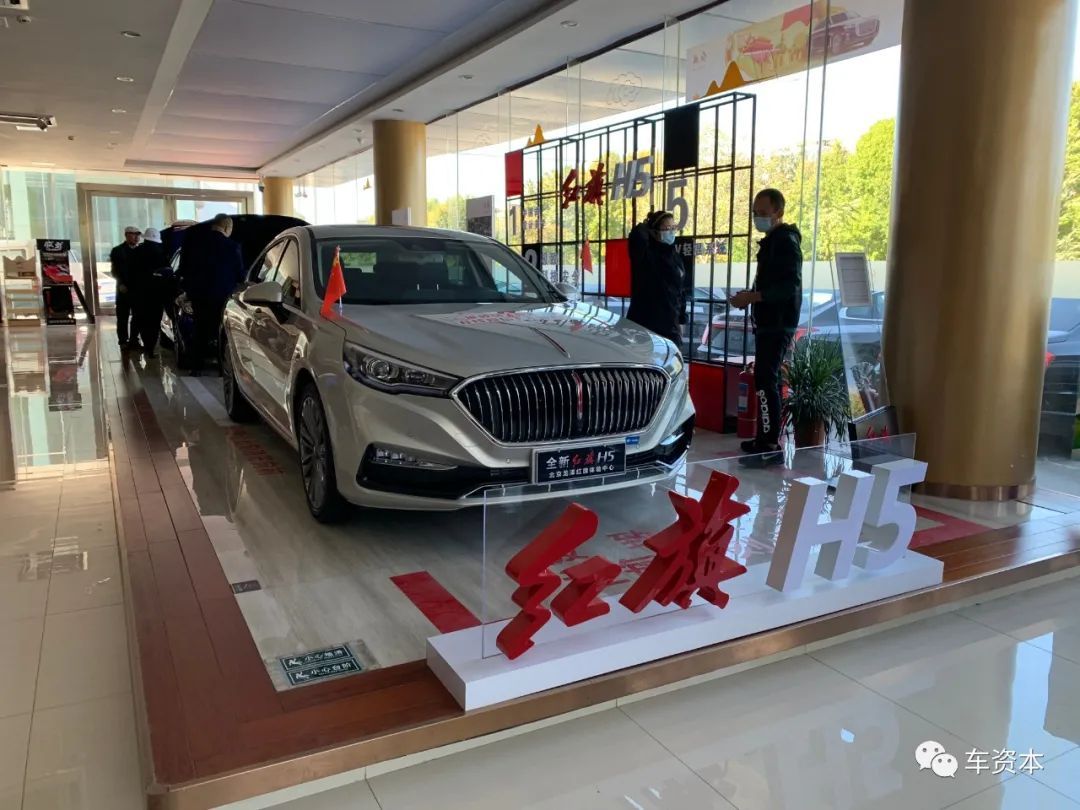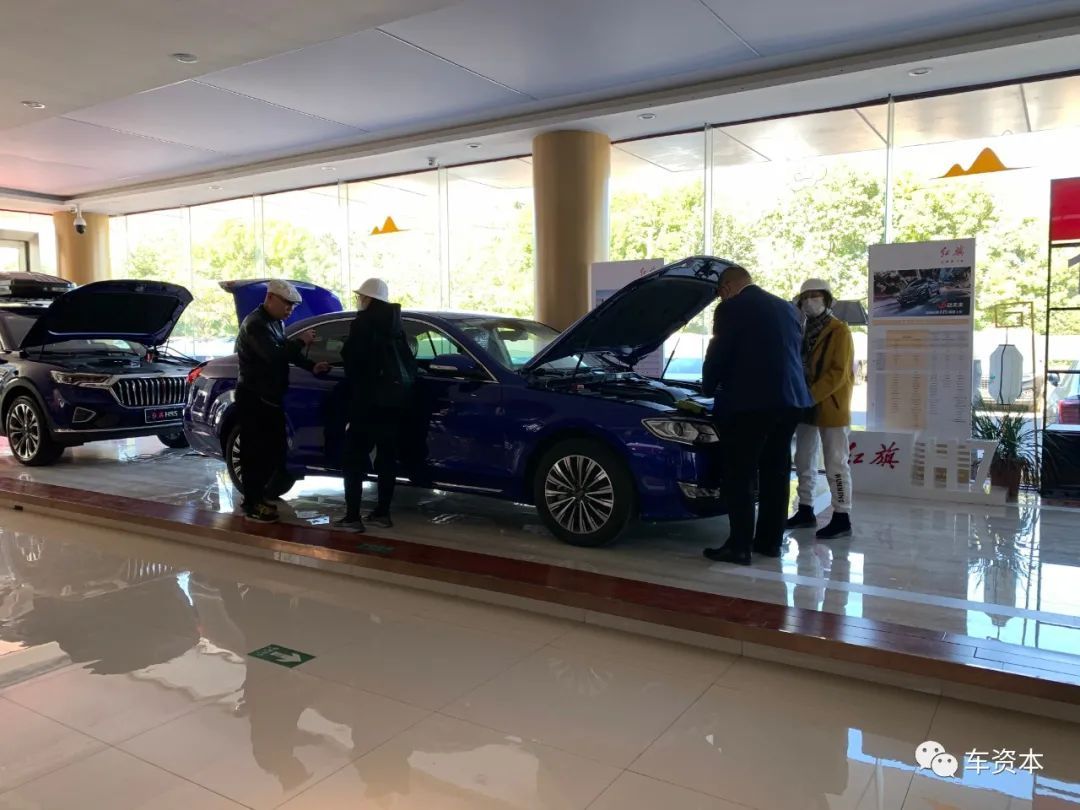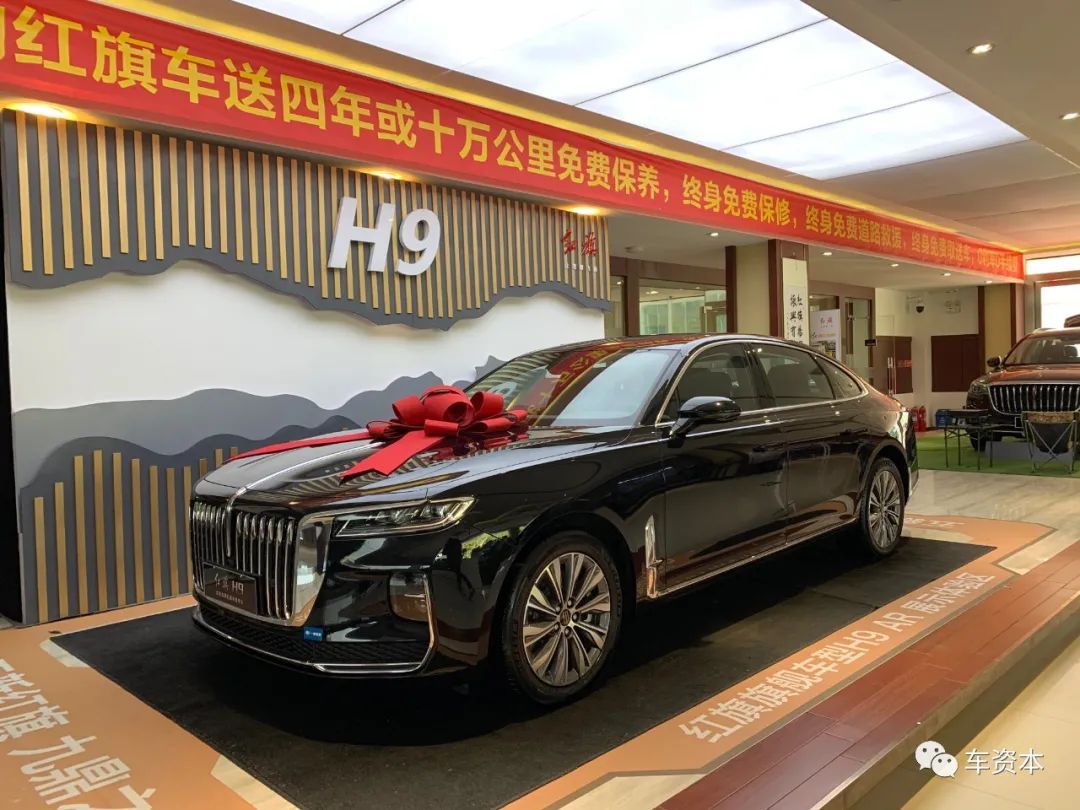
In the past September, China’s auto market once again handed over a beautiful "report card", and auto production and sales have shown growth for six consecutive months. Against the backdrop of the global auto industry being hit by the pandemic, the rapid recovery of China’s auto market undoubtedly provides a good model for the recovery of the global auto market.
However, under the premise that the domestic auto market is recovering well, the market share of Chinese brand passenger cars has shown a decline, falling to 36.4% from January to September, a year-on-year decrease of nearly 2.3 percentage points.
"The sales performance of Chinese auto brands is directly related to the trend of the auto market in the fourth quarter." An industry expert expressed the above judgment to Securities Times Car Capital.
Securities Times · Car Capital noticed that in the process of major Chinese auto brands struggling to turn around the decline, FAW Hongqi has achieved a contrarian growth that far exceeded market expectations. In September, monthly sales exceeded 20,000 vehicles, an increase of 86% year-on-year. This is a huge contrast with its sales performance in previous years.
Why did FAW Hongqi’s sales rise against the trend? What enlightenment will its growth bring to more Chinese auto brands and even the entire industry? It has become a hot topic in the industry recently.
Thunder reform works
"The competition in the entire manufacturing industry is intense, and it is more organic when it is dangerous. We saw such a prospect in FAW. Your development this year is unique."
On July 23, the top leader of the General Secretary of the Central Committee of the Communist Party of China, the President of the State, and the Chairperson of the Central Military Commission praised the red flag, the representative of the national brand, during a visit to the General Research and Development Institute of China FAW Group.
In the context of the "black swan" epidemic in China’s auto market for two consecutive years, the rise of FAW’s red flag against the trend can indeed be called "the unique scenery here".
A few days ago, China FAW announced sales data in September, Hongqi brand sales reached 21,500, an increase of 85.9%; 1-9 cumulative sales of 130,000, an increase of 104.4%. In 2019, Hongqi brand sales achieved nearly 600% year-on-year growth, cumulative sales exceeded 100,000.
Compared with the sluggish sales performance in earlier years, these two sets of data are like a "shocking reversal". What exactly did the Hongqi brand rely on to achieve a breakthrough against the trend? This has not only become a hot topic within the automotive industry, but also a hot topic for some investors.
An Qingheng, director of the China Automobile Industry Advisory Committee, told Securities Times Car Capital that the soaring sales of FAW Hongqi are closely related to its internal reforms in the past two years.
In September 2017, Xu Liuping, chairperson of FAW Group, who had been in office for less than two months, launched the Thunder Reform and adjusted the Hongqi brand to be directly operated by the group headquarters.
"This time the reform movement is particularly large. The original FAW Technology Center has been delisted, but the R & D General Institute, the Modeling Design General Institute, the New Energy Development Institute, and the Intelligent Networking Development Institute have been established respectively." An employee of FAW Group headquarters told Securities Times Che Capital on condition of anonymity that after the new organizational structure was completed, the group also carried out a "all stand up and compete for posts" personnel reform, and more than 4,000 cadres and employees at the headquarters had to be re-hired through competition.
At the beginning of 2018, the previous system reform quickly bore an important fruit – China FAW released the new Hongqi brand strategy. It is worth noting that at this press conference, China FAW called out the sales target of Xinhongqi, that is, 100,000 units in 2020, 300,000 in 2025, and 500,000 in 2035.
"Although the industry has not publicly discussed the sales target set by Xinhongqi, there are still many doubts." An Qingheng told Securities Times Car Capital that practice has proved that this series of reform policies has effectively promoted the development of Hongqi. Objectively speaking, Xu Liuping, as the helm of the company, played a key role.
An industry insider told Securities Times Car Capital that although the market share of Chinese brand passenger cars has declined and most of them face challenges, in general, there is still a strong entrepreneurial spirit in the industry, and the overall reform atmosphere is strong. Each brand is seeking transformation in line with the "new four modernizations" of the industry.
"It should be said that the revival of the Hongqi brand has exported a positive sample to the Chinese auto industry." An Qingheng believes that the successful transformation of Hongqi has brought inspiration to more independent brands and provided an upward path for reference.
Who is buying the Red Flag car?
"I was in my early 30s this year and bought a Hongqi H5 in 2019. At that time, I mainly liked the design and configuration of this car. You can’t enjoy this configuration by buying a joint venture car at the same price." Mr. Zhang, who lives in Zaozhuang, Shandong Province, told Securities Times Car Capital that in addition to high cost performance, what he values most is the overall tonality of the Hongqi brand. "Driving a Hongqi car, you seem to be very stable, and you have more face and personality," Mr. Zhang said.

Previously, people’s impression of Hongqi models was mostly "inspection cars" or concierge executive cars, which seemed to have little direct connection with the market. But with the launch of Hongqi H5, H7, HS5, HS7, H9 and other models in the past two years, this existing "stereotype" is gradually disintegrating.
A person close to China FAW told Securities Times Car Capital that according to his understanding, there are generally two types of consumers who buy Hongqi brand models. One is the more emotional and supportive, and the purchase of Hongqi cars is very national pride; the other is the more trendy consumer group. In recent years, the products launched by the Hongqi brand are more recognizable and can meet the personalized needs of consumers who pursue "different".
Pan Helin, executive dean and professor of the Digital Economy Research Institute of Zhongnan University of Economics and Law, told Securities Times Car Capital that the Hongqi brand has a deep historical sedimentation, and in this round of reform, FAW has made a good excavation of the value of the Hongqi brand. More importantly, the current market has undergone tremendous changes, and consumers’ car purchase preferences and habits are changing and becoming more diverse. This fundamental change in consumption trends will bring opportunities to Chinese car brands.
Indeed, in recent years, the rise of the national tide, Li Ning boarded the New York Fashion Week, the Forbidden City lipstick was snapped up, the white rabbit toffee, and the leap white shoes ushered in the red… Buying domestic products has become an emerging trend. Some analysts have pointed out that the rise of the national tide is not only related to the rise of young consumer groups and changes in consumer trends, but more importantly, it is closely related to the overall rise of national cultural self-confidence. Consumers can find a sense of satisfaction and belonging by purchasing domestic products full of cultural connotations.
The same is true of returning to the auto industry. At a Hongqi brand 4S store on Yaojiayuan Road in Beijing, a customer looking at the car told Securities Times Car Capital: "In recent years, Chinese brand models have improved in terms of design and product quality, especially the technology configuration is quite awesome. Driving Chinese brand models makes me feel quite proud."

Securities Times Car Capital noticed that even on weekdays, the Hongqi 4S shop is very busy, with consumers constantly coming to see the cars, and most of them are family units. "If it is on weekends, there will be a lot of consumers around every exhibition car, and there will be a queue when entering the cockpit to see the interior." Sales staff at Beijing Longze Hongqi Automobile Sales Co., Ltd. told Securities Times Car Capital.
In the most prominent position in the exhibition hall of this Hongqi 4S store, there is a Hongqi H9 that has just been listed. The above sales staff told Securities Times Car Capital that the new car has only been on the market for one month, and the order will be queued. At present, the most advanced configuration will take two months, and the personalized configuration will take almost half a year to pick up the car.

From little attention to ordinary consumers to monthly sales of 20,000 vehicles, the Hongqi brand has really moved to the end point market and completed its self-transformation.
"High-end is the right move!"
In the past period of time, some independent brands relied on price advantages to seize the market, and sales performance was also very good. But after a careful study of the pricing system of Hongqi’s main models, it will be found that "winning at a low price" is not the path chosen by Hongqi. Take Hongqi H7 as an example, its official guide price is 252,800 yuan – 317,800 yuan, and the newly listed Hongqi H9 has a guide price range of 309,800 yuan – 539,800 yuan. Obviously, the "200,000 yuan pricing ceiling" that continues to plague independent brand brands is being broken by Hongqi.
The salesperson in the Hongqi 4S store told Securities Times Car Capital that buying Hongqi’s new models does not require a price increase to pick up the car, which is a hard and fast rule of the manufacturer. However, Hongqi also rarely engages in promotional activities, and the price is relatively firm.
"Hongqi basically does not engage in promotions, and our discounts are more reflected in after-sales." The above-mentioned salesperson told Securities Times Car Capital that the purchase of Hongqi owners enjoys a lifetime free warranty service. At the same time, at the level of used car replacement, Hongqi can give the same value preservation rate as other luxury brands, relieving consumers of car replacement troubles.
Pan Helin said that in recent years, the Hongqi brand has made great efforts in marketing and channel construction, especially through the digital management model to transform the service chain, which has provided important support for the growth of sales.
It is not difficult to see that the re-started Hongqi brand is fully positioning itself as a luxury brand. In fact, many industry authorities have automatically included the Hongqi brand in the luxury brand camp in the process of ranking the sales list of automobile companies. In September, Hongqi successfully exceeded the monthly sales of 20,100 vehicles with 21,500 sales performance.
Industry insiders believe that compared with other independent brands, Hongqi’s high-end road has a natural brand advantage. An Qingheng told Securities Times Car Capital that the competition in China’s auto market is very fierce at present, and some mid-to-low-end enterprises have been gradually eliminated by the market, but independent brands, including, and so on, continue to move up and carry out high-end transformation. In his opinion, Hongqi’s sales have risen sharply against the trend, which further reflects the strength of Chinese auto brands and fully verifies the importance of high-end independent brands.
Shengang Securities analysis pointed out that the current Chinese auto brand products are no longer limited to low-price competition, and the idea of brand upward is becoming more and more obvious. Among them, higher profit levels are the driving force for brand upward.
Securities Times Car Capital learned that, taking Volkswagen Group as an example, the profit level of Volkswagen Group’s Volkswagen brand in 2019 was 4.3%, while the profit margin of its luxury brand was nearly twice that, reaching 8.1%, and the more luxurious brand reached 16.2%.
At the same time, Shengang Securities also analyzed that the solid growth of China’s automobile market in recent years has provided a solid foundation for Chinese automobile brands to move up the brand, and has also brought sufficient capital and technology accumulation space to enterprises.
However, An Qingheng also stressed that China’s auto market is very large, with both high-end and low-end markets. Companies should target precise market segments according to their own positioning. At the same time, whether it is high-end or low-end, the most important thing is to improve product quality. This is the foundation for building brand power and influence.